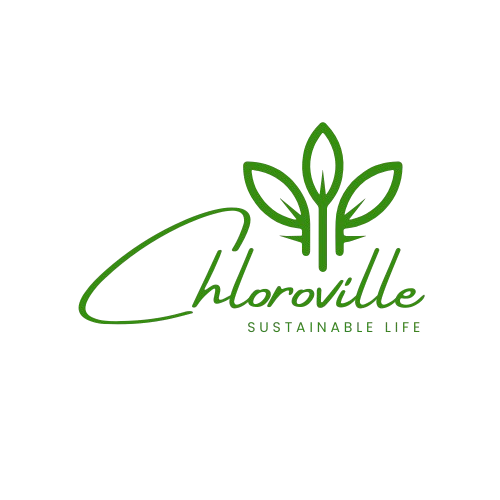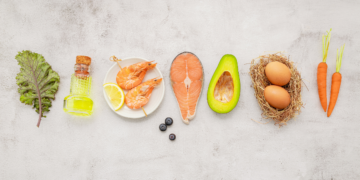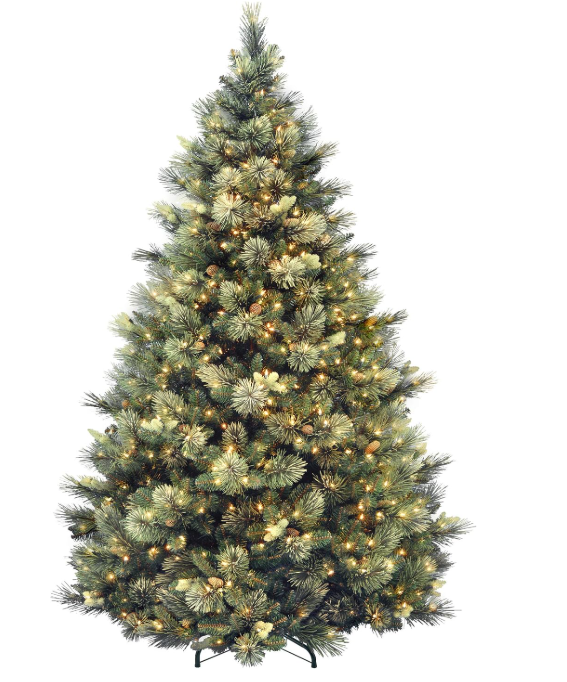Wondering what to do with old beer? Instead of pouring it down the drain, why not repurpose it in your garden? Beer for plants is not only an eco-friendly way to reduce waste, but it also offers surprising benefits for both indoor and outdoor gardens. From natural fertilizers to pest control, these 10 beer gardening hacks will help your garden thrive while making use of leftover beer.
Whether you’re a seasoned gardener or just getting started, here’s how to use beer in your garden for healthy, vibrant plants. Let’s dive into these beer gardening hacks!
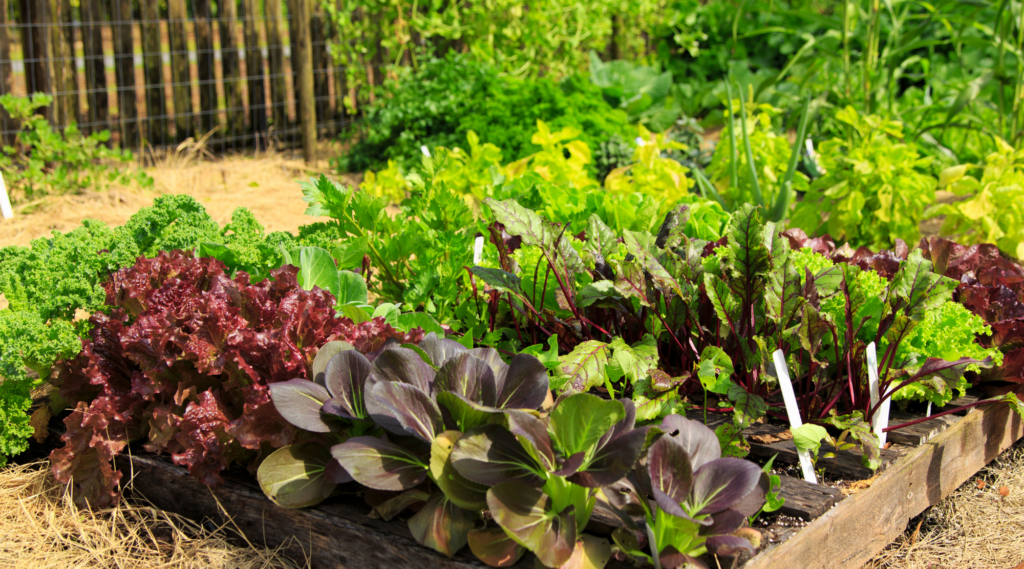
Learn more beginner-friendly tips to boost your garden’s success with our guide on easy vegetables to grow.
Hack 1 – Compost Jump Starter
Did you know that beer can speed up composting? The yeast and sugars found in beer act as a natural compost starter, accelerating the decomposition process.
How to Use It:
- In a container, mix 1 bottle of beer, 1 cup of water, and 2 tablespoons of sugar or molasses.
- Stir well until the sugar or molasses is fully dissolved in the mixture.
- Pour the beer-sugar solution evenly over the compost pile.
- Use a pitchfork or shovel to turn the compost and ensure the liquid penetrates throughout the material.
- For best results, turn the compost every few days to improve airflow and speed up the decomposition process.
By combining beer with sugar or molasses, you’re providing an ideal environment for the microbes to thrive, resulting in faster composting and richer, more nutrient-dense compost for your garden.
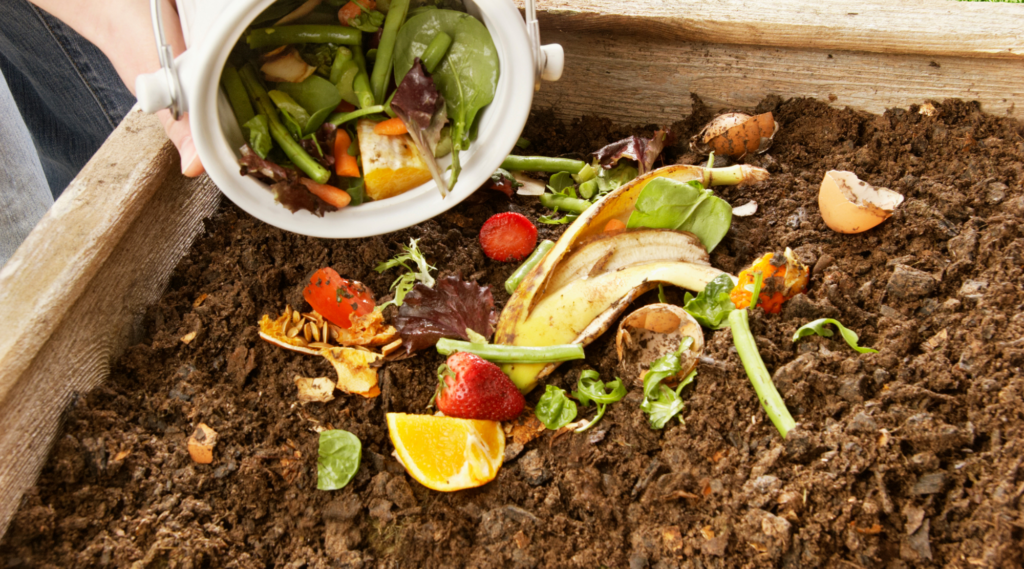
Learn more beginner-friendly tips to boost your garden’s success with our guide on easy vegetables to grow
Hack 2 – Fungi Killer
Beer can act as a mild fungicide, helping control fungi like powdery mildew or black spot on your plants. The combination of yeast and alcohol creates an environment that inhibits fungal growth.
How to Use It:
- Mix 1 part beer with 2 parts water in a spray bottle.
- Lightly spray the solution onto the affected areas of the plant, focusing on the spots where the fungi are present.
- Alternatively, use a clean cloth to apply the mixture directly to the fungal-infected areas.
- Reapply every 3-5 days until the fungal problem is under control.
- Be cautious not to saturate the soil with this mixture, as it is intended for surface application on the plant itself.
This solution works best on minor fungal infections and should be used as part of your plant’s regular care routine.
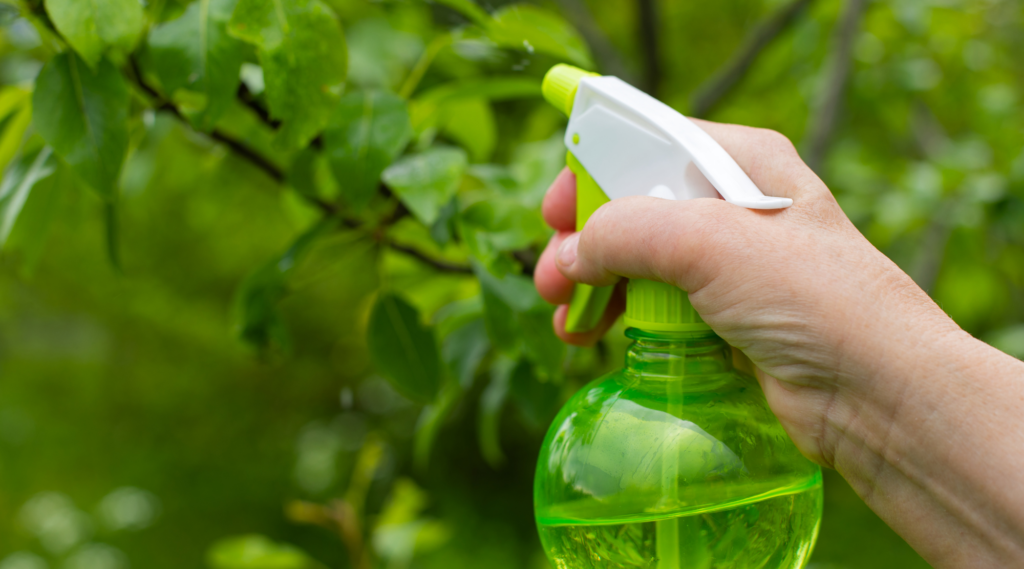
Hack 3 – Slug and Snail Trap
Slugs and snails are attracted to the smell of yeast in beer, making it a natural and effective trap to keep these pests away from your plants.
How to Use It:
- Take a shallow dish (like a jar lid or plastic container) and pour 1-2 inches of beer into it.
- Place the dish near areas where slugs and snails tend to congregate, such as around garden beds, leafy plants, or moist areas.
- Bury the dish so that the rim is level with the soil—this allows the slugs and snails to easily crawl in.
- Check the traps daily, discarding the trapped pests and refilling the dish with fresh beer as needed.
This hack helps control slugs and snails without using harmful chemicals, protecting your plants from damage.
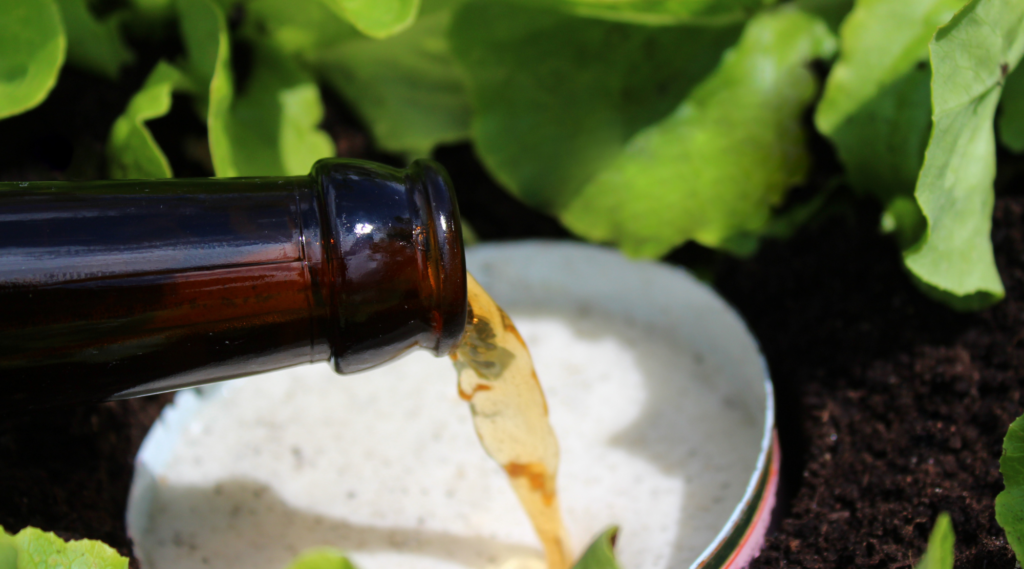
Learn more about natural ways to control pests in your garden with our guide on companion planting.
Hack 4 – Beer Fertilizer Recipe for Healthy Plants
Beer contains potassium, yeast, and carbohydrates, which can nourish plant roots and promote healthy growth. What plants benefit from beer? Mostly flowering plants, shrubs, and even lawns can benefit from this homemade fertilizer.
How to Use It:
- Mix 1 part beer with 10 parts water in a large watering can.
- Stir well to ensure the beer is diluted evenly. Avoid using undiluted beer, as it can harm plants due to its alcohol content.
- Slowly pour the solution around the base of the plants, soaking the soil but avoiding contact with the leaves to prevent burning.
- Apply this mixture every 2-3 weeks for a nutrient boost, particularly for plants in poor or depleted soil.
This beer fertilizer recipe is especially useful for plants that need a little extra care and can help restore nutrients to tired soil.
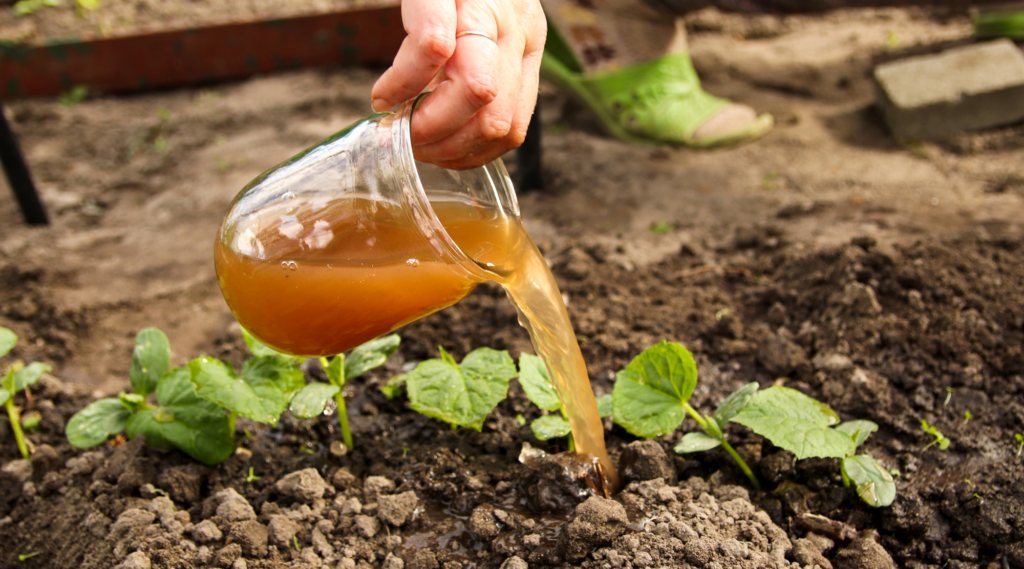
Hack 5 – Grass Greener
Reviving patchy grass is easy with beer. The nutrients in beer, particularly potassium and sugars, feed the grass and help restore its green color.
How to Use It:
- Mix 1 bottle of beer with 2-4 tablespoons of molasses in a garden sprayer. Stir until the molasses dissolves completely.
- Add water to fill the sprayer and shake to mix.
- Spray the solution evenly over the affected patches of your lawn, focusing on areas that are brown or thinning.
- Repeat the process once a month until the grass begins to recover.
This mixture provides your lawn with nutrients while encouraging healthy grass growth.
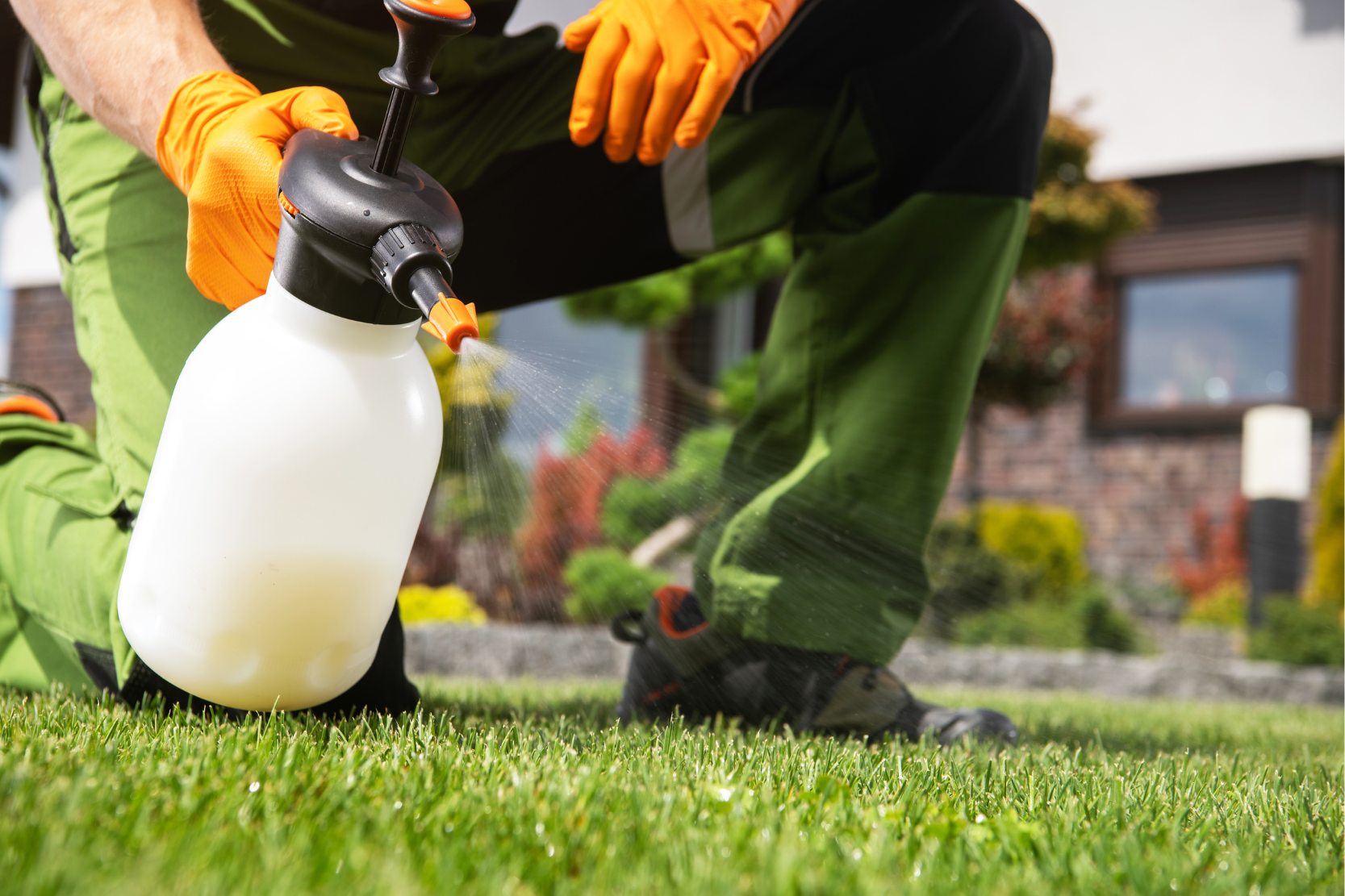
Hack 6 – Wasp Bait
Wasps are drawn to the smell of beer, making it an effective bait for creating a simple DIY trap.
How to Use It:
- Take a 2-liter plastic bottle and cut off the top part just below the neck.
- Invert the cut-off top (without the cap) and place it inside the bottle, creating a funnel shape.
- Pour 1-2 inches of beer into the bottle to act as the bait.
- Place the trap outdoors, away from busy areas but near where wasps gather.
- Check the trap regularly and dispose of it once it’s full. Refill with fresh beer if needed.
This trap helps reduce wasp populations in your garden, making it a safer place to relax.
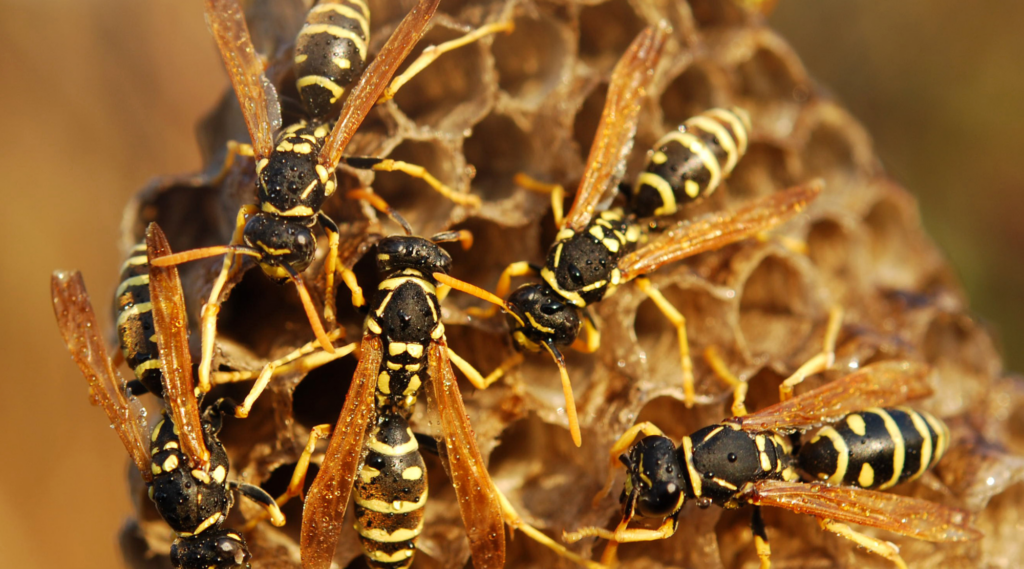
Hack 7 – Butterfly Attractant
Attracting butterflies to your garden not only adds beauty but also supports pollination. Beer for plants can be used as butterfly bait to bring these beneficial insects into your garden.
How to Use It:
- Pour 1/2 cup of beer into a shallow dish or saucer.
- Cover the dish with mesh or coarse cloth to prevent butterflies from drinking the beer directly.
- Hang the dish from a nearby branch or place it on a raised surface like a fence post—butterflies prefer to feed at heights.
- Place the dish near flowering plants to encourage butterflies to visit your garden.
This method draws butterflies to your garden without harming them and promotes healthy plant pollination.
For more tips on using beer to attract butterflies, check out this interesting guide on beer for attracting butterflies.
Hack 8 – Rust Remover for Garden Tools
The acidity in beer can help break down rust on metal tools, making it a simple and eco-friendly cleaner.
How to Use It:
- Submerge your rusted tools in a bucket of beer. Ensure that the rusty parts are fully submerged.
- Leave the tools to soak for 20 minutes to a few hours, depending on the severity of the rust.
- After soaking, scrub the tools with a stiff brush or steel wool to remove the rust.
- Rinse the tools with water and dry them thoroughly to prevent further rusting.
This trick is a great way to restore garden tools without using harsh chemicals.
Hack 9 – Beer for Indoor Plants
Can I pour old beer on indoor plants? Yes, but only when properly diluted. Beer provides nutrients for plants but must be used cautiously indoors.
How to Use It:
- Mix 1 part beer with 10 parts water in a watering can.
- Water your indoor plants sparingly with this mixture, focusing on the soil and avoiding the leaves.
- Apply this fertilizer every 3-4 weeks for a gentle nutrient boost.
For indoor plants, the diluted beer adds essential nutrients while avoiding over-fertilization, which can lead to salt buildup in the soil.
Hack 10 – Tree Protector
Beer can also act as a natural pest barrier for trees, especially when combined with dish soap.
How to Use It:
- Mix 6 bottles of beer with 1 cup of dish soap in a garden sprayer.
- Spray the solution around the base of your trees and exposed roots to create a barrier against pests like ants and beetles.
- Reapply the solution after heavy rainfall or once every 2 weeks to maintain the barrier.
This method not only deters pests but also helps the soil around your trees absorb nutrients.
Conclusion:
By now, you’ve learned how to use beer for plants in a variety of creative ways. Whether you’re using it as fertilizer, pest control, or a compost starter, these beer gardening hacks offer an eco-friendly solution to repurposing leftover beer.
Give these hacks a try and watch your garden thrive! If you have any of your own beer-related gardening tips, feel free to share them in the comments.
